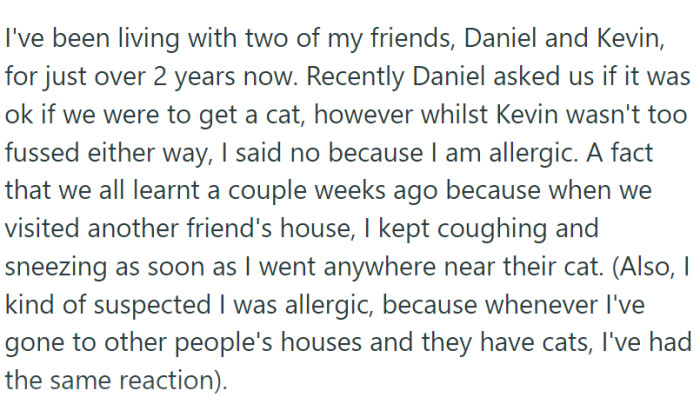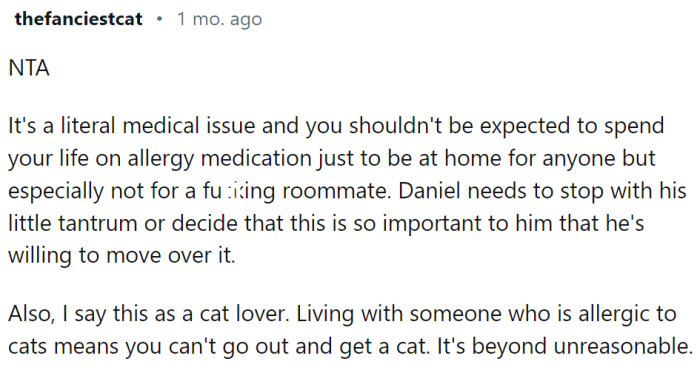Allergic Man Stunned by Roommate's Decision to Get a Cat and Simply Make Him Take Allergy Pills
Pet allergies are a common concern for many individuals worldwide. Sneezing, coughing, and itching can turn any delightful encounter with a furry friend into an ordeal.
These allergies can severely impact an individual's quality of life, especially when living in shared spaces. A recent personal account from an individual living with roommates sheds light on the complexities of navigating allergies and interpersonal relationships.
Let's discuss the story of three roommates: the writer, Daniel, and Kevin. They've been living together for about two years, and things have been going pretty well. But recently, Daniel had the idea of getting a cat for their place.
Kevin was on the fence about it, but our writer had a clear problem – they are allergic to cats. Just a few weeks ago, during a visit to another friend's place with a cat, they ended up sneezing and coughing the whole time. It wasn't the first time this had happened.
Daniel, trying to find a middle ground, suggested, "Why not take allergy pills?" The writer didn't like the idea. First, that's an added expense they didn't want. And second, why should they take pills for something they're not even keen on?
Here's where things got messy. Daniel, instead of understanding the situation, started making jokes about the allergy. What began as friendly teasing turned mean.
Comments like "Maybe we should just replace you with the cat" started flying around. It wasn't long before the atmosphere in the house became extremely tense.
The Writer Asks:

The Writer has been living with his friends for over two years. One of them wants to get a cat. The Writer is allergic, so he said no.

The situation was tense, heated even more by the roommate saying that the Writer should just take pills.

Living with allergies can create significant interpersonal tension, particularly when roommates make lifestyle decisions that overlook health considerations. A study published in the Journal of Allergy and Clinical Immunology found that individuals with allergies experience heightened stress levels when their environments are not accommodating. This stress can exacerbate symptoms and lead to emotional distress, impacting overall well-being. Recognizing the importance of empathy and open communication in shared living situations can help mitigate these tensions and foster healthier relationships.
Practical Solutions for Roommate Agreements
To navigate the complexities of living with allergies, establishing a roommate agreement can be beneficial. According to conflict resolution researchers, such agreements should outline shared responsibilities and health considerations. For example, setting guidelines on pet ownership, cleanliness, and medication management can create a supportive environment. Incorporating regular check-ins allows roommates to voice concerns and adapt to each other’s needs over time, fostering cooperation and understanding. These strategies can enhance the living experience for everyone involved.
Understanding Allergies and Living Situations
Dr. Anne Peterson, an allergist at Johns Hopkins University, emphasizes that living with allergies requires clear communication and mutual understanding among housemates.
When one roommate decides to bring a pet into a shared space without considering the needs of others, it can lead to significant conflict.
Research shows that individuals with allergies often experience heightened stress when their needs are not respected in communal living situations.
The Writer is afraid he might lash out, ruining their friendship.

The Writer has offered the following explanation for why he thinks he might be the a-hole:

Even without an allergy, it would be perfectly fine to not want a cat. All roommates have to agree. "No" is a complete sentence.

Understanding Roommate Dynamics
Research indicates that roommate relationships often reflect broader social dynamics, including conflict resolution and negotiation skills. According to social psychologists, establishing clear expectations can significantly enhance cohabitation experiences. A study conducted at the University of Michigan emphasizes that setting rules regarding shared spaces fosters a sense of ownership and responsibility among roommates. Implementing a discussion about allergies and pet ownership may help in reaching a mutually agreeable solution, reducing potential conflicts in the household.
This scenario highlights the importance of establishing clear agreements regarding pet ownership in shared living situations.
Studies in social psychology suggest that mutual agreements can enhance relationships and reduce conflict.
When everyone understands each other's needs, it fosters a more harmonious living environment.
The Writer should be making plans to move out.

"Put your foot down now."

The Writer should check the lease agreement for policies on pets.

The psychological principle of the 'fundamental attribution error' may be at play in situations like these. Individuals often attribute their own actions to situational factors while attributing others' actions to their character. Research by Dr. Lee Ross, a psychologist at Stanford University, highlights this bias, which can lead to misunderstandings among roommates. Recognizing this cognitive bias can help individuals approach discussions with greater empathy, understanding that their roommates may not fully grasp the impact of their decisions on others.
The Importance of Open Communication
To prevent issues related to allergies, it's essential for roommates to engage in open discussions about shared spaces.
Therapists recommend setting boundaries early on regarding pet ownership and allergies to ensure everyone feels comfortable.
By facilitating honest communication, roommates can prevent misunderstandings and foster a respectful living environment.
The Bottom Line is:

The Writer posted an update. The roommate has dropped the subject after being criticized by a room full of people.

In a shared living situation, compromise and understanding should be the name of the game. It's not about who gets their way but about creating a comfortable environment for everyone involved.
Daniel's approach, instead of being supportive, was insensitive and out of line. If we're sharing space, every voice matters, and every concern should be taken seriously.
It's plain wrong to put someone's health and comfort at risk for personal wants. Roommates need to remember that mutual respect isn't just a courtesy – it's a necessity.
The writer's concerns were legitimate, and Daniel's behavior was a textbook example of how not to handle shared living disagreements. To wrap it up, while pets can be great, it's always essential to consider everyone in the household.
After all, it's all about living together in harmony, right?
Additionally, roommates should explore solutions that consider everyone's needs.
Research shows that collaborative problem-solving can lead to better outcomes in shared living situations.
Involving all roommates in discussions about allergies and pet ownership can promote understanding and reduce tensions.
Psychological Analysis
This situation highlights the need for proactive communication about allergies and pet ownership in shared living arrangements.
Addressing these issues early can prevent conflicts and foster a more supportive living situation for everyone involved.
Analysis generated by AI
Analysis & Alternative Approaches
Ultimately, navigating allergies in shared living situations requires clear communication and mutual respect.
By discussing needs openly and finding collaborative solutions, roommates can create a harmonious living environment.
Psychological Analysis
The situation outlined here underscores the importance of empathy and understanding in shared living spaces. Daniel's lack of sensitivity towards his roommate's cat allergy seems rooted in a disregard for his roommate's well-being, leading to a toxic environment. Open communication, mutual respect, and a willingness to compromise are crucial for harmonious cohabitation.
Analysis generated by AI
In summary, navigating living situations with allergies requires both understanding and proactive communication. By recognizing the psychological dynamics at play and employing effective coping strategies, roommates can create a harmonious environment that respects individual health needs. The importance of empathy and negotiation cannot be overstated, as they lay the foundation for sustained positive relationships. Ultimately, fostering an open dialogue and creating structured agreements can significantly alleviate stress, enhancing the quality of life for all roommates involved.



